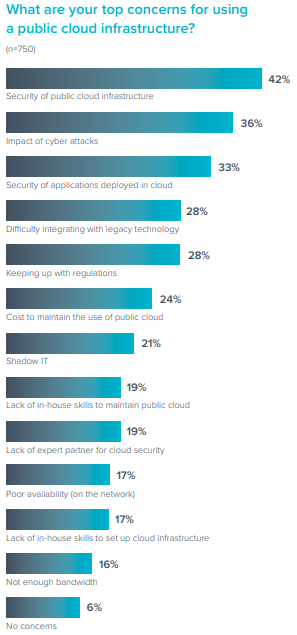News
Security Cited as Top Public Cloud Inhibitor
Barracuda Networks commissioned a survey to explore the enterprise digital transformation in which the use of public cloud computing platforms is key, seeking to gauge the impact of security roadblocks and how they can be overcome.
The unsurprising results confirmed that organizations are indeed moving their computing infrastructure to public clouds, and that security is the top concern restricting faster adoption. What's more, the number of organizations that report being attacked by cybersecurity villains has increased, affecting three quarters of respondents, up from 56 percent in 2017.
"Our survey clearly indicates that the most important inhibitor to faster public cloud growth is security, with 70 percent of respondents saying that security concerns restrict their organizations' adoption of public cloud," the survey says. "These security concerns include the security of public cloud infrastructure, the impact of cyberattacks and the security of applications deployed in public cloud. It is not surprising that security concerns are top of mind with respondents, as 75 percent have already been targeted by a cyber-attack."
In fact, when asked about top concerns about using public cloud infrastructure, the top three reported items were related to security, finally followed by "difficulty integrating with legacy technology" and "keeping up with regulations."
 Top Public Cloud Concerns (source: Barracuda).
Top Public Cloud Concerns (source: Barracuda).
Some security-related findings from the report include:
- On average, six hours per week are spent by staff managing and preventing security breaches, and for nearly a third (29 percent) of organizations, security staff spend an entire day or more per week on such tasks.
- The top threats respondents see to public cloud infrastructure cover a broad sweep, from sophisticated hackers (45 percent) and application vulnerabilities (40 percent) to phishing (38 percent) and exposed corporate networks (37 percent).
- The same number of respondents (70 percent) in 2017 and 2020 claimed they are heavily or partly restricting public cloud adoption due to security concerns.
As noted, integration was also a major concern, affecting many fronts:
- Integrating public cloud with legacy technologies
- Better integration with private cloud
- Enhanced integration with on-premises infrastructure
The report cites the software-defined wide-area networking (SD-WAN) space in another key takeaway, finding it "appears to be the technology of choice for organizations keen to achieve a securely integrated network for their cloud deployments." Some 23 percent of respondents reported having already deployed SD-WAN, with 51 percent being in the deployment process or expecting to deploy over the next year. Only 6 percent say they have no SD-WAN deployment plans (17 percent are "considering" such deployment).
Barracuda summarized the report, titled "Future Shock: The Cloud Is The New Network," thusly: "The digital transformation is underway. At the center of this profound change is the move to public cloud. But security concerns remain. Your customers will benefit from the seamless integration of cloud native network services with cloud infrastructure, making cloud the backbone of the modern distributed enterprise. However, cyber-attacks are a constant threat, costing organizations time and money to mitigate on a weekly basis."
The company commissioned market researcher Vanson Bourne to interview 750 IT decision-makers with responsibility for or knowledge of their organizations' cloud infrastructure for the February 2020 report. Respondents worked at organizations of all sizes and across a broad range of sectors in Europe, the Middle East and Africa (EMEA), Asia-Pacific (APAC) and the United States.
The survey was promoted by the Barracuda MSP business unit, which provides security-related products to protect email, networks, data and more.
About the Author
David Ramel is an editor and writer at Converge 360.